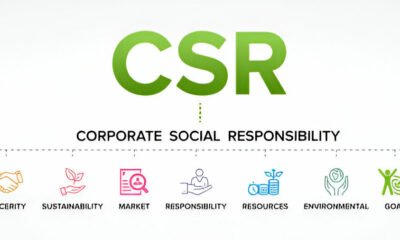

Features
Has CSR reached its sell-by date? Part 1
According to the textbooks, CSR – corporate social responsibility – is broadly defined as a voluntary commitment from business to embrace responsibility for its actions and to impact positively on the environment, on society and on consumers, employees and other stakeholders.
If everyone agreed on this definition and if CSR did effectively enable business to increase its positive impacts, then I would be its most vociferous cheerleader. Unfortunately, the reality is that CSR, as currently understood and implemented, is not fit for purpose. In fact, I believe it was fundamentally flawed from the very beginning.
In her recent article, What is CSR?, Ilaria Bertini explores largely the textbook definitions. However, she does mention one of the larger elephants in the room by noting that some critics argue “CSR programmes undertaken by companies like McDonalds and BP are ways to distract the general public from their unethical business.”
I have worked in what pro-market commentators refer to disparagingly as ‘the burgeoning CSR industry’ for more than 11 years. But you don’t need me to tell you that while CSR has been en vogue and thousands of the world’s largest businesses have been busily ‘doing CSR’, the enormous challenges and threats to our planet and future remain unsolved.
Indeed, finite natural resources are being depleted at a quickening rate, the environment is increasingly degraded and the wealth gap between the winners and the losers continues to widen apace – to provide but a few examples. Further, corporate fraud and scandal remain commonplace and public trust in business is at an all-time low. Evidently, CSR isn’t working.
My charges against current CSR, which I will discuss in greater detail in a subsequent article, are as follows:
1 – It is a waste of precious business resources. It costs time and money for businesses to ‘do CSR’ and produce reports that no one reads. Those precious resources should be invested in improving actual responsibility practices instead
2 – It ignores the fundamentals of capitalism. That is, offloading costs onto society and the environment and exploiting stakeholders as and where possible is how business currently maximises profit
3 – The brand and marketing people control the message and they will only approve positive messages. This prevents businesses from providing honest, believable appraisals of their negative impacts on society and environment; and thus honest, believable plans for putting things right
4 – Businesses that ‘do CSR’ keep making the wrong kinds of headlines, e.g. Starbucks, HSBC and Serco to name but a few
5 – Too often, CSR is about talking up the little bit of good a business does in an attempt to offset or divert attention from a whole lot of bad, as illustrated below (see point 3)

Talking about the good to divert attention from the bad is not responsible
6 – When used as a cynical device to continue with ‘business as usual’, CSR is downright fraud
As a result:
7 – CSR is not relevant or believable to the man in the street and
8 – CSR destroys public trust
I advocate we bin the term CSR altogether and find new ways to do genuinely responsible, ethical, fair, sustainable business and demonstrate that that is what we are doing.
I am not naïve as to how challenging being in business is. I started our company 10 years ago and know all about the hard reality of balancing the books, staying abreast of the competition and delivering the goods and services people want at the appropriate quality and price. This makes it all the clearer to me just how absurd it is to persist with CSR as it is.
Given the mess the world is in, given how serious that is, and given we desperately need business to serve society – not the other way round – I challenge all those businesses that are ‘doing CSR’ to prove that what they say is a genuine reflection of what they do.
Businesses are either fully committed to adopting the best responsibility practices possible, right across their organisations, or they are not. Businesses are either fully committed to decreasing their negative impacts on society and the environment and increasing their positive impacts or they are not.
The milestones they need to reach are set out in the illustrations below. Can there be any other test of business responsibility that is simpler or clearer?

Responsibility journey: milestone 1 – the good equals the bad

Responsibility journey: final destination - the good outweighs the bad
Not only do I believe that this can be done without businesses reducing their profits, I believe a genuine positive approach to meeting stakeholder expectations of social responsibility can increase profitability. Profit is the most potent driver of business. Genuinely responsible, ethical practices can become a source of competitive advantage. In doing so, we all – businesses, society, and the planet as a whole – benefit.
I am convinced the changes that need to be made are wholly achievable. They start with simple openness and honesty. By simply admitting the challenges they face, businesses can gain credibility and build trust.
Profit Through Ethics, the company I founded, has built the tools needed to do this and is building a social movement which makes real responsibility a driver of profitability and creates better businesses for a better world. If you are persuaded by this critique of CSR and interested about this movement, please join us at www.responsible100.com.
Michael Solomon is director of Responsible 100. On April 15, an event in London will question whether CSR has reached its sell-by date. Click here to find out more information, and here to read the second part of this article.
Further reading:
Some corporate social responsibility has ‘gone stale’
‘Corporate social responsibility is an attitude of mind’
Sustainability in the workplace reflects on employees’ personal choices, says study
Taking steps towards a new ethical age of business
Merging the great business dilemma: profit v sustainability, responsibility and ethics
































